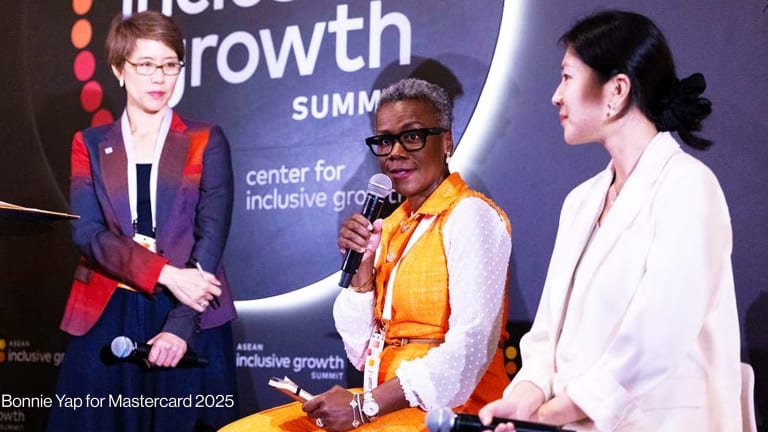
Almost 82% of NGOs in low- and middle-income countries cite a lack of funding as their biggest barrier to adopting digital tools for social impact. What’s more, data.org’s 2023 data for social impact, or DSI, report, Accelerate Aspirations: Moving Together to Achieve Systems Change, found that when it comes to financial support, funders overlook the power of advanced data strategies to address longer-term systemic solutions — instead focusing on short-term, project-based outcomes.
That’s a real problem as we look to deploy powerful, data-driven interventions to solve some of today's biggest crises — from shifting demographics to rising inequality to pandemics to our global climate emergency. Given the urgent challenges our world faces, pilots, one-offs, and underresourced program interventions are no longer acceptable.
It’s time we — as funders, academics, and purpose-driven data practitioners — acknowledge that data is power. And how do we truly harness that power? We must look toward innovative, diverse, equitable, and collaborative funding and partnership models to meet the incredible potential of data for social impact or risk the success of systems-level solutions that lead to long-term impact.
Investment in systems and capacity is not overhead
In data.org’s Accelerate Aspirations report, we spoke to data practitioners, social impact leaders, and funders around the world to assess key trends and tensions in the emerging field of DSI. Kriss Deiglmeier, chief of social impact at Splunk — a leading security and observability platform that helps organizations use data — urged funders to think of the bigger picture and invest in data and technology ecosystems.
“For all those nonprofits that want to be data forward, they are stuck in a funding system that does not fund organizational effectiveness,” Deiglmeier noted. “Step one is that funders need to start investing in data and technology to drive mission results. Thinking in terms of overhead is for the past.”
Durable, data-based social impact solutions must be systemwide interventions that invest not only up and down the data stack but within and across organizations as well. It involves investment in shared resources, such as digital public goods. And it includes a commitment to capacity building.
According to a World Economic Forum report, data capabilities are the most in-demand skills globally, and data.org found that there is a significant opportunity to create and support a talent pool of over 3.5 million data for social impact jobs in LMICs over the next decade. Creating a workforce of highly skilled, diverse, interdisciplinary data practitioners could advance our sector toward more effective and scalable solutions.
Katherine Lucey, who leads Solar Sister — a social enterprise supporting women in Africa to create clean energy businesses — offers a great example of what you can unlock when you invest in the human and data capacity to accelerate impact. With data.org’s support through the Inclusive Growth and Recovery Challenge, she invested in making sure she had data experts on her team and the budget to support them in the long term. As a result, Solar Sister saw a 25% increase in the number of new entrepreneurs they recruited in one year, and her work has become a model for how data science can help steer social impact.
Single-source, siloed solutions are a thing of the past
The Accelerate Aspirations report also found that most of the funding that social impact organizations rely upon does not consider other — often redundant — activities and investments across the sector.
“There is this total lack of coordination, resulting in broad fragmentation,” said Stefaan Verhulst, co-founder of the research center GovLab, which works to develop and test prototypes for new data collaboration platforms. “If we’re going to solve problems in a way that extends beyond one community or geography or sector, entities and organizations must work together to establish different models for data and funding collaboratives, as opposed to everyone having to set up their own thing.”
Improvement lies in better coordination among diverse partners, and long-term, well-resourced multisector — public, private, academic, social impact organization, philanthropic — partnerships based on honest and clear conversations about our different incentives.
“I’ve seen academics and funders and practitioners walk into a room a bit wary,” said Arturo Franco, senior vice president at Mastercard Center for Inclusive Growth. “But inevitably you come to a moment when you all realize that you can speak the same language and understand the different roles that each sector needs to play. From there, you can get to a very concrete and exciting idea that everyone can support. It’s magic.”
Advancing the use of data for a more resilient world
It's time to take risks and act boldly to drive data for good. data.org's Accelerate Aspirations: Moving Together to Achieve Systems Change is a comprehensive analysis of the key trends and tensions in the emerging field of data for social impact. Download and share the report.
The IDEA initiative from J-PAL Africa is one example of how improved coordination drives outcomes. After piloting innovative partnerships and data-sharing agreements between researchers, data providers, and governments, they published the IDEA handbook as a guide on how data can be safely and ethically accessed, and how partnerships between researchers and data providers can be navigated.
We must move from aspiration to action
We have the power to build — and fund — a data-driven social impact sector that drives affordable and innovative ways of addressing the multitude of challenges we face.
But to do so, we must do the hard work to change how we as individuals, organizations, funders, and ecosystems operate. We must change how we work, partner, fund, learn, iterate, and adapt.
As we move from aspiration to action to achieve the vision of a powerful DSI sector, read the Accelerate Aspirations report and consider how you can join our work at data.org, by taking risks, aligning incentives, and partnering differently to drive sustainable and systemic change.
Join data.org to build a platform for partnerships in the field of data for social impact and sign up to receive our newsletter.








